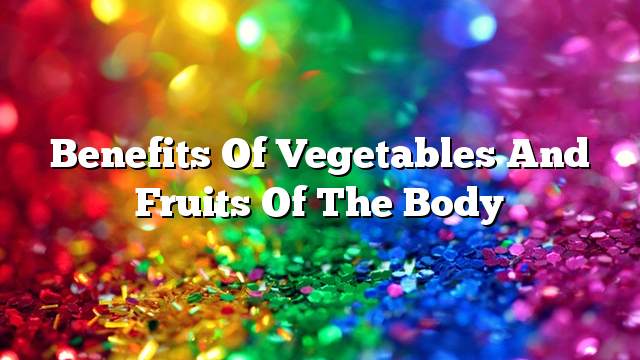Food
Food is defined as a solid or liquid substance that provides the body with many essential nutrients that it can not produce to sustain its vital processes. In addition, it provides energy and helps it to grow and reproduce. The foods that exist in nature vary from plant to animal, but the most healthy ones are fruits and vegetables Protect it from many chronic diseases and provide the body with many nutrients necessary for health, and in this article will highlight the benefits of the body.
The nutritional value of vegetables and fruits
Vegetables and fruits are rich sources of many essential nutrients, including:
- Vitamins are divided into two types:
- Vitamins that are soluble in fat, which are stored in fatty tissues for use when needed, include vitamin K, vitamin D, vitamin A, vitamin E, and their sources of fruit: raspberries, melons, blueberries, grapes, kiwi and peaches. It is vegetables: tomatoes, sweet potatoes, carrots, turnips, green turnips and Chinese cabbage.
- These vitamins are not stored in the body and are excreted through the urine, including complex B vitamins such as vitamin B12, vitamin B6, folic acid, niacin, thiamine, and vitamin C. Their sources of fruit are raspberry, melon, Grapefruit, kiwi, lemon, orange, pineapple, strawberry, and vegetables such as asparagus, red and green peppers, spinach, sweet potatoes, broccoli, broccoli and cauliflower.
- Which include:
- Potassium is necessary to regulate heart rate and prevent irregularity, and its sources of fruits are bananas, peaches, dates, raisins, cherries, grapefruit, and their sources of vegetables include potatoes, sweet potatoes, beans and carrot juice.
- Calcium is essential for strengthening teeth and building bones and preventing their fragility. Fruit sources include berries, blackberries, dates, blackberries, jujube, dates, oranges and papaya. Vegetables include sweet potatoes, spinach, spiny land, and pumpkin.
- Iron, which helps to transport oxygen molecules throughout the bloodstream, includes fruit from jujube, dates, berries, raisins and raspberries. Vegetables include artichokes, lentils, pumpkins, spinach, and chickpeas.
- Carbohydrates and fiber, necessary to promote gastrointestinal function and reduce the risk of high cholesterol, heart disease and type II diabetes in addition to weight control.
Benefits of vegetables and fruits of the body
Among the most important benefits of eating vegetables and fruits that return to the body:
- Preventing cardiovascular diseases and strokes. Potassium in vegetables and fruits keeps blood pressure healthy, and dietary fiber helps lower cholesterol levels.
- Reducing the risk of certain cancers. Studies by some health professionals have shown that lycopene in tomatoes can help protect men from prostate cancer.
- Improving eye and eye health, eating fruits and vegetables avoids eye catarrh and macular degeneration. A study published in the Archives of Ophthalmology shows that lutein and zeaxanthin present in vegetables and fruits positively affect the health of the eye.
- Reducing the risk of type 2 diabetes, studies have shown that eating fruits and vegetables paper will reduce the risk of diabetes.
- Promote the health of the digestive system, in addition to get rid of some disorders such as constipation, and the richness of vegetables and fruits with dietary fiber that helps.
- Preserve the health of the skin and make it more fresh and vibrant, and also fights the signs of aging that may appear on them because they contain antioxidants that fight free radicals that accelerate the signs of aging.
- Helps lower blood pressure, because it contains potassium, in addition to the prevention of kidney stones, which is also important to maintain the health of bones and prevent them from fragility.
- Vegetables and fruits are low calorie foods, making them very useful in dieting to lose weight. Eating fruits and vegetables constantly keeps your body healthy and healthy.
- Treatment of wounds and injuries and maintain the health of teeth and gums, in addition to increasing the efficiency of the body absorption of iron, for the richness of vegetables and fruits with vitamin C, which helps.
- Reduce the risk of congenital defects in the fetus, to contain the vegetables and fruits folic acid, which protects against these defects during pregnancy, and advised to increase it in the first trimester of pregnancy.
Tips and Advice
Many nutrients in vegetables and fruits are lost during cooking because some are sensitive to heat and air, especially vitamin C and B vitamins and folic acid. Cooking methods maintain these nutrients, such as steam cooking or microwaves, where a small amount of water is used In addition to the speed of the less time to cook food decreased the rate of loss of nutrients, and the following tips to keep the nutrients while preparing to eat for both vegetables and fruits:
Vegetables
- Be careful to cut vegetables large pieces, to reduce the amount of vitamins wasted when exposed to air.
- Keep cooking utensils tightly closed for heat and steam to go out as well as speed up cooking time.
- Do not over-cook vegetables.
- Use small amounts of water when cooking.
- Take care to eat raw vegetables and introduce them to the authorities.
- Use cooking water residues for soups, sauces and yachts.
fruits
- Take care to eat fresh fruit instead of natural juices to take advantage of their dietary fiber.
- Choose potassium-rich fruits, such as bananas, peaches, peach juice, dried peaches, apricots, and orange juice.
- Take care to buy canned fruit that contains fruit juice or 100% water instead of a factory drink.
- Wash the fruits thoroughly with water before preparing or eating them, rubbing them by hand to remove dirt and surface microorganisms and dry them thoroughly with a clean cloth.
- Take care to keep fruit away from raw meat, poultry and seafood while preparing, shopping or storing.
